Is your brain playing tricks on you? Did you know our mind tricks us in different ways to alter our perception and understanding of the world? Our brain is incredible yet complex and at times, can be our own worst enemies. The human mind can do wonderful things but it also bends and distorts our perception of reality to make the journey of life smoother and easier for us.
Your own mind can often deceive you into believing that something is right when in reality, it may be quite the opposite. There are many ways our brain can alter our perception of the world, like our ability to remember our past more pleasantly than it was and or our tendency to do the exact opposite of what someone tells us to do.
Hence, it is crucial that we identify and discredit these tricks our brain plays to make us view the world in a warped way. When we can do that, we will be able to build stronger relationships, achieve success, and create lifelong happiness.
16 Mind tricks that affect your perception
Here are some of the most common tricks our own brain plays on us to deceive us. Take a look…
1. Optimism bias
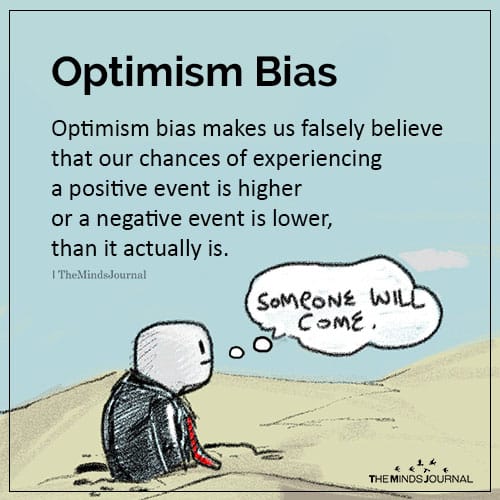
Most of us tend to overestimate the possibility of something turning out great. Although having a positive mindset and attitude can be beneficial, often it can affect our decisions and judgments in an adverse manner.
Optimism bias refers to a false belief that your probabilities of facing negative situations and outcomes are lower and your likelihood of getting positive or favorable outcomes are higher comparatively.
2. Negativity bias

The concept of negativity effect claims that negative things have a greater and stronger effect on our mental state than positive or neutral things, even though they may be of the same intensity. The pain of loss and rejection influences our mind, thoughts, behavior, and emotions a lot more than fleeting experiences of joy & pleasure.
Negative bias means we process negative stimuli a lot faster and readily than positive stimuli and it leaves a lasting impression on us as well. Negative things influence our thinking more than positive things.
Related: A Psychologist Explains How You Can Rewire Your Brain To Get Rid Of Negative Thoughts
3. Pessimism bias
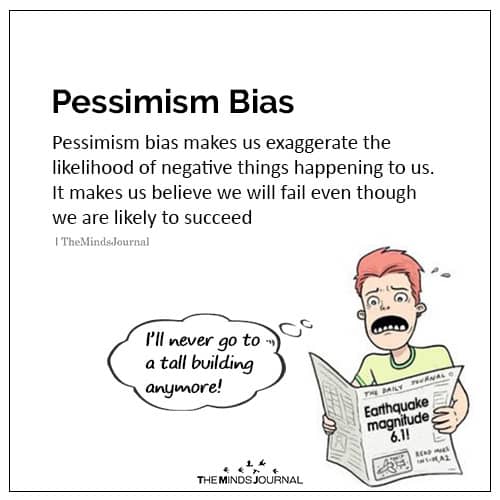
Although it’s easy to confuse this with negativity bias, pessimism bias actually refers to the fact that we tend to overestimate the likelihood of our decisions resulting in bad or undesired outcomes. We use pessimism as a defense mechanism to protect ourselves and keep our hopes down as we believe it will help us cope with the likelihood of disappointment.
It is a cognitive bias which makes us exaggerate the possibilities of negative things happening to us.
4. Anchoring bias
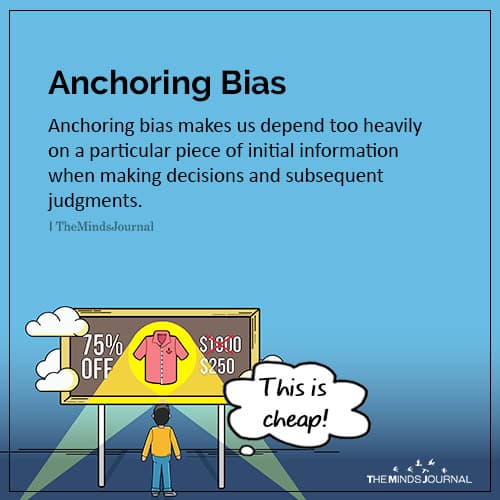
Our first judgment about something or someone affects our consequential decisions and judgment in every way related to it. Anchoring is the reason why the first impression someone leaves on us is the strongest.
Anchoring, also known as focalism, is used in psychology to explain our basic tendency to heavily rely on a particular piece of information or trait when making any decisions. This is why you must be careful when purchasing something expensive as we tend to believe if something is expensive it is of high quality.
5. Backfire effect

We tend to strongly hold on to our beliefs and principles especially when someone challenges them as our beliefs are a part of our identity. The backfire effect can make us defend our beliefs strongly when we are confronted with attitude-inconsistent evidence and facts.
We protect our collection of beliefs from harm in a subconscious and instinctive way and reject that evidence to strengthen our original stance. It simply means that trying to prove that people are wrong is ineffective and can backfire.
Related: 15 Common Cognitive Distortions That Twist Your Thinking
6. Placebo effect

In medicine, a placebo is something that appears as genuine medical treatment but is, in fact, fake. However, the patient often feels better by taking the ‘fake’ medicine even though it might not have any real medicinal effect. It simply means that, like our bodies, we can get anything done if we choose to believe it.
According to the placebo effect theory, you can treat yourself simply by believing. Our mind is an incredible healing tool and the power of belief can make anything happen. Our mind tricks us to believe something is real even when it is not. Science has confirmed that placebos can be as effective as actual treatments.
7. Sunk cost fallacy
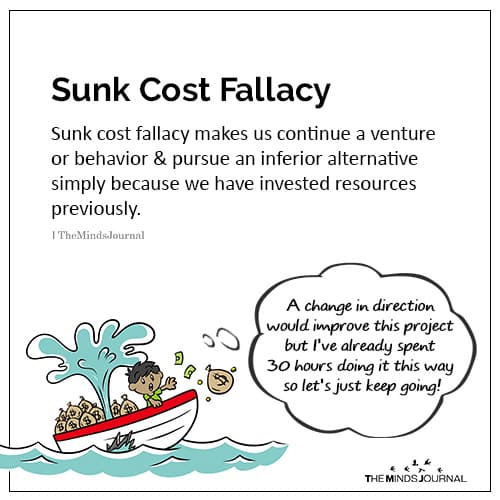
We unreasonably hold on to things, people and relationships because we have already invested something in it, whether it’s money, time, effort or emotional strain. According to a 2018 study on sunk cost fallacy, when we pursue “an inferior alternative merely because we have previously invested significant, but nonrecoverable, resources in it” then it leads to an evident violation of logical decision making.
As we are unable to let go of these things, we desperately cling on to them which compels us to make irrational commitments and decisions regarding useless relationships and objects.
In a TIME magazine article, Christopher Y. Olivola, author of the study, stated:
“The sunk cost effect is the general tendency for people to continue an endeavor, or continue consuming or pursuing an option if they’ve invested time or money or some resource in it. That effect becomes a fallacy if it’s pushing you to do things that are making you unhappy or worse off.”
8. Fundamental attribution error
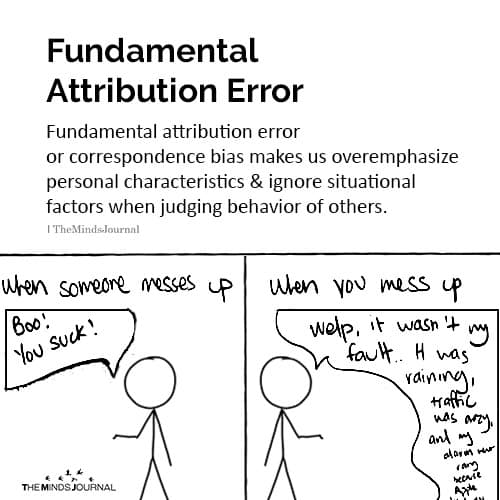
We judge people based on their personality and character, while we judge our own selves based on the circumstances.
Fundamental attribution error posits that we instantly judge others when they do something wrong and blame it on their poor character and flawed personality. However, we tend to forgive ourselves a lot easier when we do something wrong or act poorly as we believe we were in a tough situation.
9. Rosy retrospection
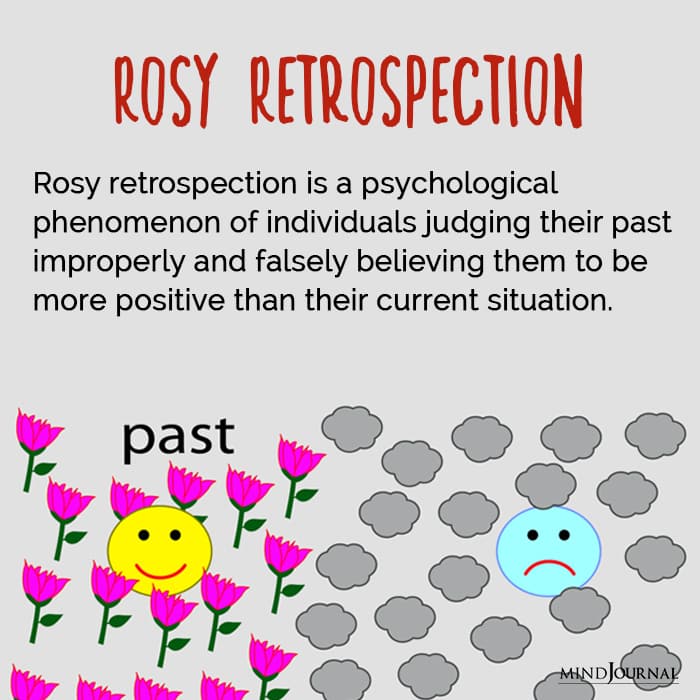
Most of us tend to remember our past as more pleasing than it actually was. Moreover, we expect our future to be riddled with problems and be much worse than it probably will be. Our mind tricks us into believing that the past was better than it was in reality.
Rosy retrospection is a psychological phenomenon of individuals judging their past improperly and falsely believing them to be more positive than their current situation.
Related: 5 Scientific No-Fail Ways To Improve Your Memory
10. Confirmation bias

We tend to seek ways to validate & justify our previously held beliefs by accepting ideas that support our ideals, avoiding anything contradictory in the process.
Confirmation bias makes us support and prefer information that confirms our currently existing biases and beliefs.
11. Spotlight effect

We tend to overestimate our belief that others usually observe and notice how we appear, behave and act in public. However, in reality, most people are preoccupied with their own things and focus on their own issues and agendas rather than on others.
The spotlight effect makes us falsely believe that people notice us more than they do in reality.
12. Just world hypothesis
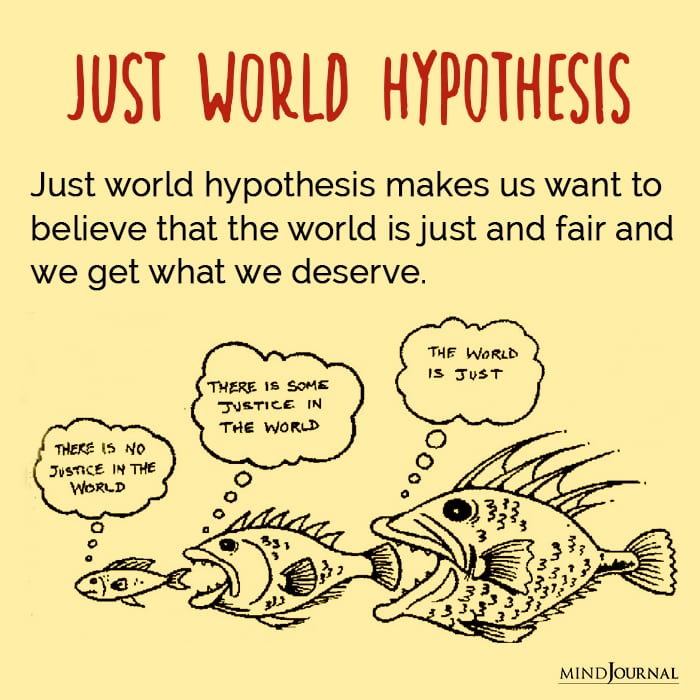
It is because we want the world to be fair, we tend to believe that it is. We presume that good things happen to good people and bad people get what they deserve. We believe that hard work pays off in the end. However, it is not necessarily the truth.
Just world hypothesis makes us want to believe that the world is just and fair and we get what we deserve.
13. Halo effect

How we judge someone depends on how intensely we like or feel attracted to that person. As human beings, we judge others as a natural instinct. However, this judgment often depends on how well we get along with that person.
Halo effect is when our general impression of someone determines how we think and feel about their behavior, actions, and character.
Related: The ONLY Sign To Know For Sure If She Is Attracted To You
14. Dunning-Kruger effect

This is one of the most common mind tricks that most of us experience. According to this concept, the more knowledge we have about a particular topic, the less confident we feel about what we know about it. The more you know, the more you underestimate your abilities. Conversely, people who have little understanding of something, generally overestimate their capability and understanding.
Developed by psychologists David Dunning and Justin Kruger, the Dunning-Kruger effect is when people who have little understanding of something, generally overestimate their capability and understanding.

15. Curse of knowledge

This is another one of the most common mind tricks that we fall victim to. It is a cognitive bias where an individual unintentionally assumes that all other people they communicate with possess the background knowledge about the topic they are discussing necessary to properly understand their message.
The curse of knowledge refers to the belief that because you know something, you assume others understand it too. It is when we fail to realize that other people may not know what we already know.
16. Framing Effect
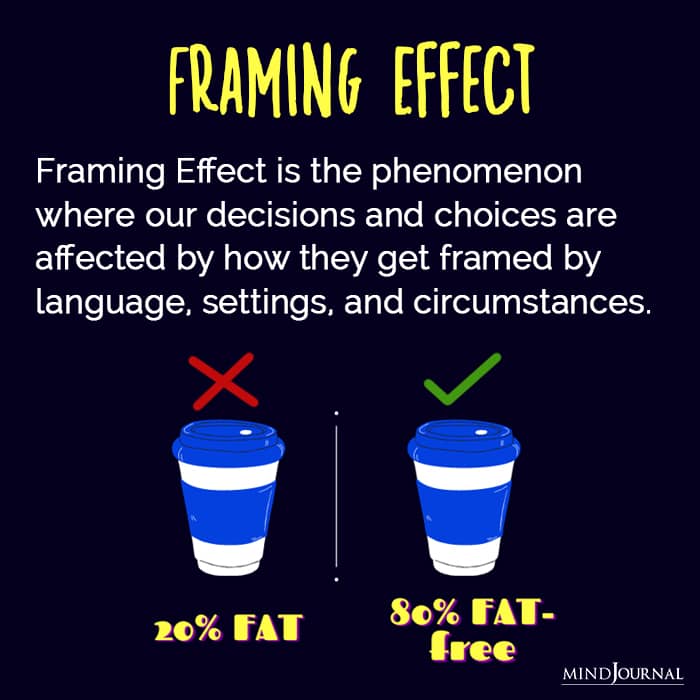
The framing, context & delivery of new ideas affect us a lot more than we may realize. The entire advertising industry is based on this trick our brain plays on us as our mind is highly receptive to subtle cues in verbal & body language.
The Framing Effect is the phenomenon where our decisions and choices are affected by how they get framed by language, settings, and circumstances. It is a cognitive bias where we choose options depending on how the options are presented, with negative or positive connotations.
Related: Your Brain Is a Liar: 7 Common Cons Your Brain Uses
Understanding mind tricks
Our brains play various tricks on us and make us develop a lot of false beliefs for various reasons. These tricks can often confuse us in our daily lives. But in reality, these tricks are designed to help us understand life better and survive the various challenges life throws at us. So even though these phenomena may be just tricks, it is the reason we are who we are.
Learning about and understanding how your mind tricks us can help us ascertain how these affect our lives, how they change our perceptions of the world, and how we may live a happier, better, and more fulfilling life.
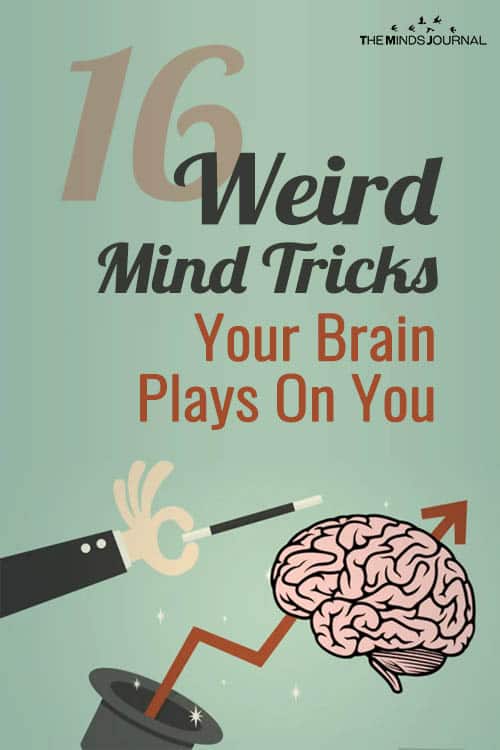

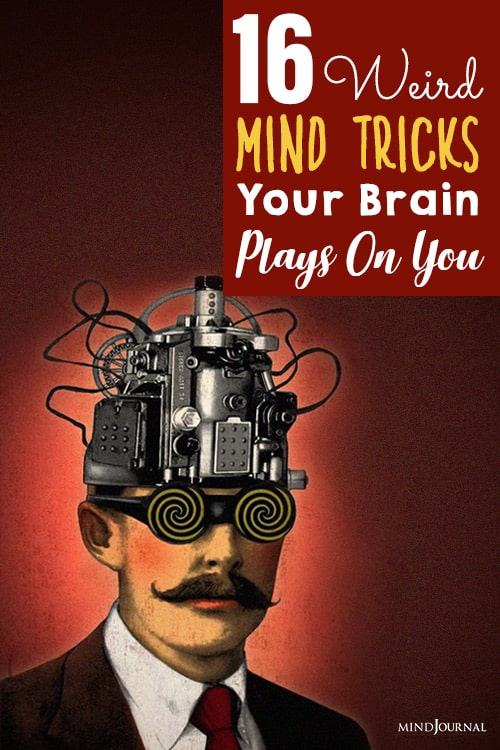


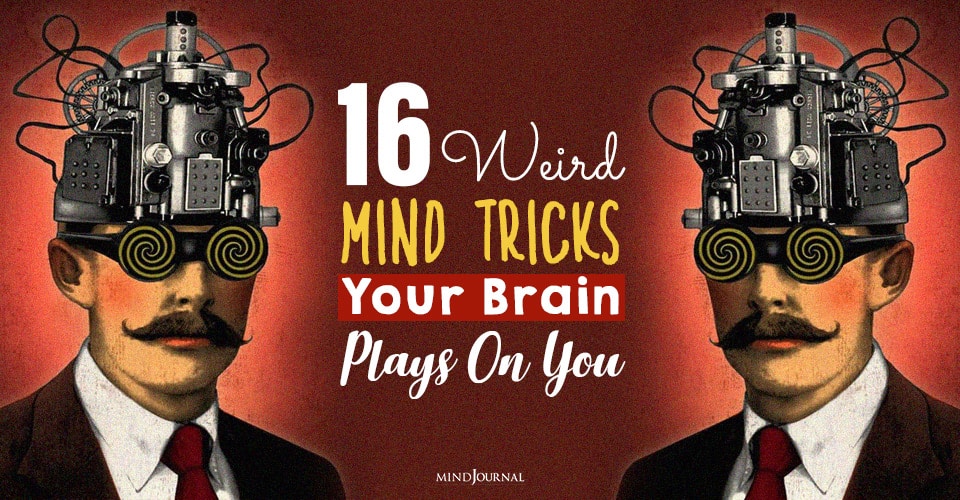







Leave a Reply